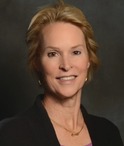Reilly Lecture - Frances H. Arnold: Biocatalysts for Abiological Chemistry: Bringing New Chemistry to Life

Dr. Frances Arnold
Abstract:
We create enzymes that catalyze reactions not known in living systems. Our approach to expanding nature’s catalytic repertoire is inspired by how nature innovates: new enzymes appear when the ‘promiscuous’ activities of existing proteins become useful for meeting new challenges or exploiting new opportunities. Mimicking this, we start with existing proteins (in my refrigerator or in databases) and identify catalytic activities that may be known to synthetic chemistry but that nature has not (yet) discovered. Proteins with even very low levels of activity can become new enzymes as we accumulate beneficial mutations in sequential rounds of mutation and screening (directed evolution).
We have found that heme proteins are a wonderful source of new biochemistry: engineered cytochrome P450s and other heme proteins catalyze a wide range of synthetically useful carbene and nitrene transfer reactions, from alkene cyclopropanation to Si-C bond formation to direct amination of C-H bonds. It’s fascinating to observe how members of nature’s vast catalog of proteins can be evolved—with only a few mutations—to catalyze these reactions with high efficiency and selectivities, even selectively forming chemical bonds that are unknown in biology. These results demonstrate the ease with which evolution can innovate. In the future these fully genetically-encoded catalysts may access vast areas of chemical space that life has not explored.
Biography:
Frances Arnold is the Dickinson Professor of Chemical Engineering, Biochemistry, and Bioengineering at the California Institute of Technology, where her work focuses on protein engineering by directed evolution, with applications in energy, chemicals, and medicine.
Dr. Arnold’s awards include the Raymond and Beverly Sackler Prize in Convergence Research (2017), the Millennium Technology Prize (2016), the Eni Prize in Renewable and Nonconventional Energy (2013), and the Charles Stark Draper Prize of the US National Academy of Engineering (2011) for her pioneering innovations in using laboratory evolution to create new enzymes. She was awarded the National Medal of Technology and Innovation in 2011 and was inducted into the National Inventors Hall of Fame in 2014. She has also been elected to membership in all three US National Academies of Science, Medicine, and Engineering and the American Academy of Arts and Sciences. Prof. Arnold has honorary doctorates from Stockholm University, the ETH Zurich, and the University of Chicago. She chairs the Advisory Panel of the David and Lucile Packard Foundation Fellowships in Science and Engineering program and serves as a judge for the Queen Elizabeth Prize in Engineering.
Frances Arnold holds more than 50 US patents and is active in technology transfer. She co-founded Gevo, Inc. in 2005 to make fuels and chemicals from renewable resources and Provivi, Inc. in 2013 to develop non-toxic modes of agricultural pest control. She has a BS in Mechanical and Aerospace Engineering from Princeton University and a PhD in Chemical Engineering from UC Berkeley.
This public lecture is co-sponsored by the Department of Chemical and Biomolecular Engineering's Reilly Lecture Series, and the Notre Dame Institute for Advanced Study (NDIAS).
Initiated in 1958, the distinguished Reilly Lectureship at Notre Dame is perhaps the oldest continuing endowed lectureship in chemical and biomolecular engineering in the United States. The lecture series is supported by the Peter C. Reilly Fund, which was established in 1945 in honor of the late Peter C. Reilly, a former University Trustee and recipient of an honorary LLD degree. Each Reilly speaker gives two talks in the lecture series; one for a general audience and a technical talk. The Reilly Lectures now occur annually each spring.